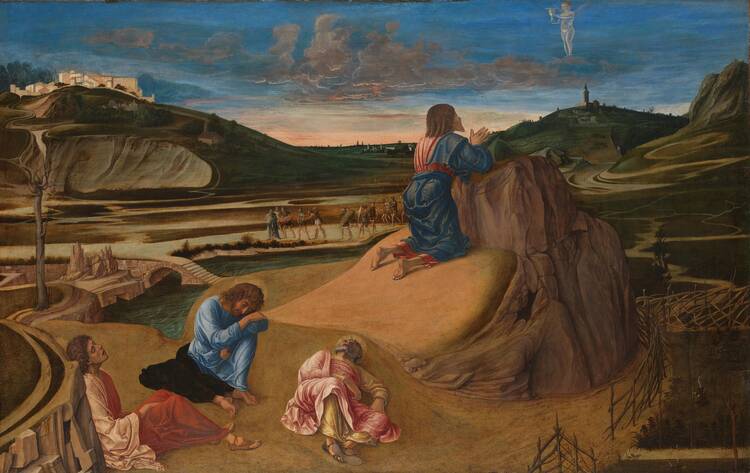A Homily for Palm Sunday of the Lord’s Passion
Readings: Matthew 21:1-11 Isaiah 50:4-7 Philippian 2:6-11 Mathew 26:14, 27:66
Palm Sunday is the most disjointed day of the church’s year. Its liturgy begins so joyfully only to conclude most woefully. Still, the emotional distance we travel in those few moments of worship is but a faint echo of the lethal storm which, in his final hours, tore through the soul of Christ.
Yet there is a destined design, linking the Lord’s triumphal entry into Jerusalem with his death on the cross. We find it in the garden, the night before Jesus died. That’s where he begins to suffer his spiritual agony, and that anguish may have been worse, more woeful, than his coming physical torments.
That is the nature of human suffering. The dread of what is coming, of what might be, precedes what does indeed come, and within that small word “might” lies a torment beyond telling. As we are unable to quiet our racing minds, imagination inflicts an unbounded cruelty upon us.
That night, in the garden, the Lord Jesus was spiritually torn from his earthly life. As the popular mania of his entrance gives way to a manhunt, it is shredded before his eyes. The only world Jesus has ever known, his community and creed, rejects him.
Jesus enters the garden with eleven of his disciples. He immediately separates himself from eight of them. We often do the same in moments of great terror and trouble. We retreat into a small circle of intimates or into ourselves. Somehow, to suffer alone seems preferable than to do so in the sight of others. Jesus calls three of his closest companions to himself.
Then he said to them,
“My soul is sorrowful even to death.
Remain here and keep watch with me” (Mt 26:38).
Yet even this trio, witnesses to his Transfiguration, fails him in the darkness. They fall asleep. Jesus is utterly alone.
In only a few hours, the Christ traverses an oft-told tale. As we age, our loved ones fall away. Humans cannot long survive solitude for long. If it is absolute and without relent, it surely kills. “My soul is sorrowful even unto death.”
Palm Sunday is the most disjointed day of the church’s year. Its liturgy begins so joyfully only to conclude most woefully.
As a divine person of the Trinity, Jesus was Son of God in a way we will never be. Yet in coming among us, he emptied himself of his divine attributes. So, having surrendered omniscience, Jesus had to discern his unique identity, just as we do, in the signaling silence of prayer. This is where a presence—a goodness, truth, and beauty, presents itself to us, befriends us. In the daily prayer of Jesus, this indescribable presence took on an identity, a name synonymous with safety, security: Father.
Herein lies the nadir of Christ’s spiritual suffering. Jesus calls upon his Father.
Withdrawing a second time, he prayed again,
“My Father, if it is not possible that this cup pass
without my drinking it, your will be done!” (Mt 26:42).
St. Matthew records no response.
This cup has no bottom. The soul of Jesus falls into fathomless fear. In St. Matthew’s Passion, when all the suffering, spiritual and physical, is done, Jesus dies, offering another unanswered prayer. “My God, my God, why have you forsaken me?” (27:46).
This is the great spiritual agony of the Christ. This is the start of his spiritual death. Jesus slips solitary into silence and darkness. “My soul is sorrowful even unto death.”
Indeed, it was. Sooner or later, nature is always merciful. Death comes to us as a remittance, an end to the suffering. But in this garden, where Adam once defied God, destiny demands of the Christ, in the unique union of his divinity and humanity, something he alone can give, something he will give for love of us: an infinite agony, a suffering that cannot be sounded. “My soul is sorrowful even unto death.”








